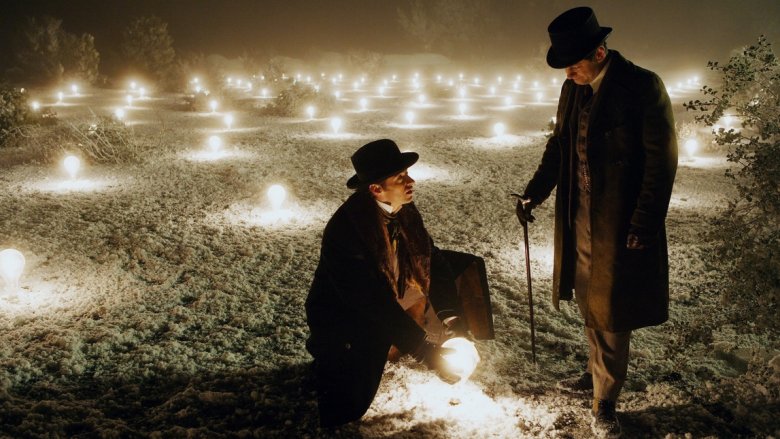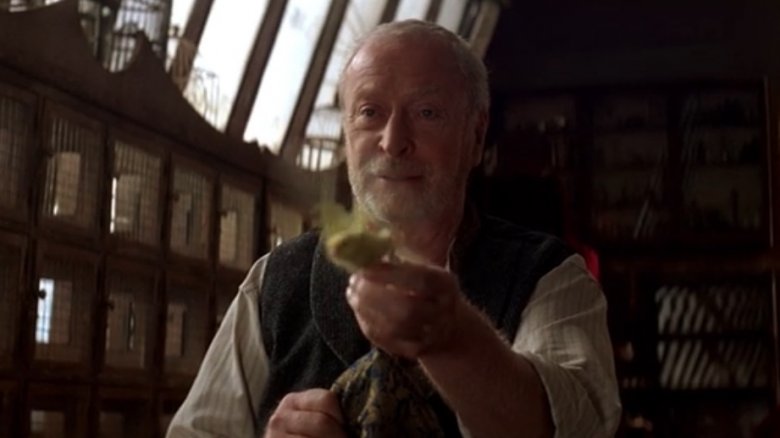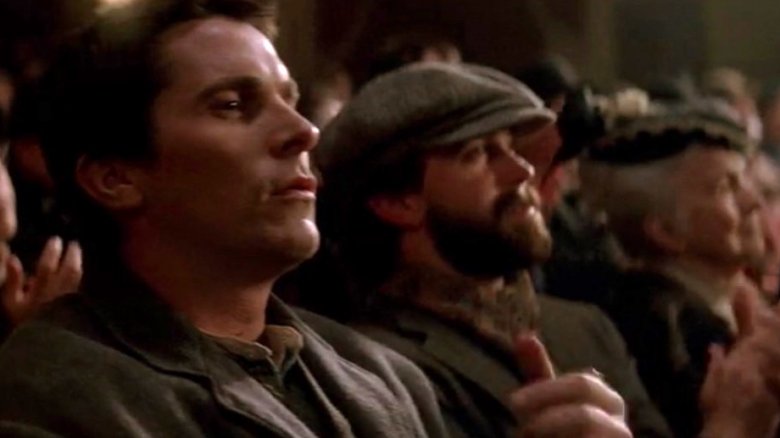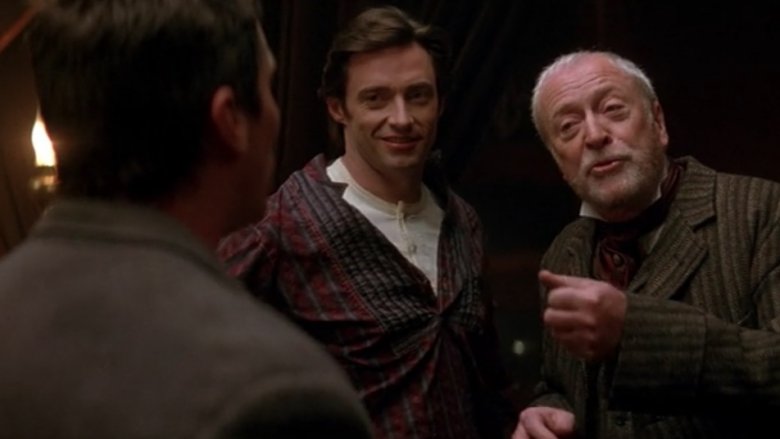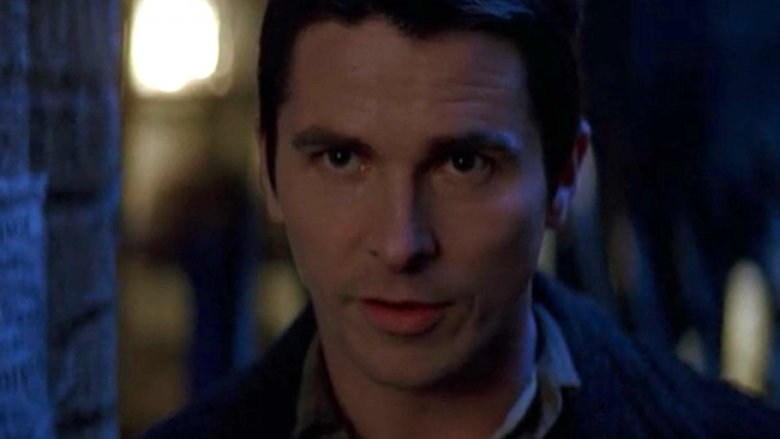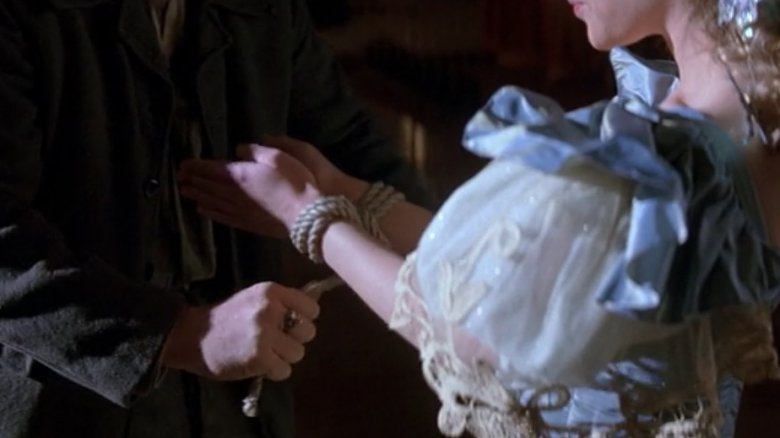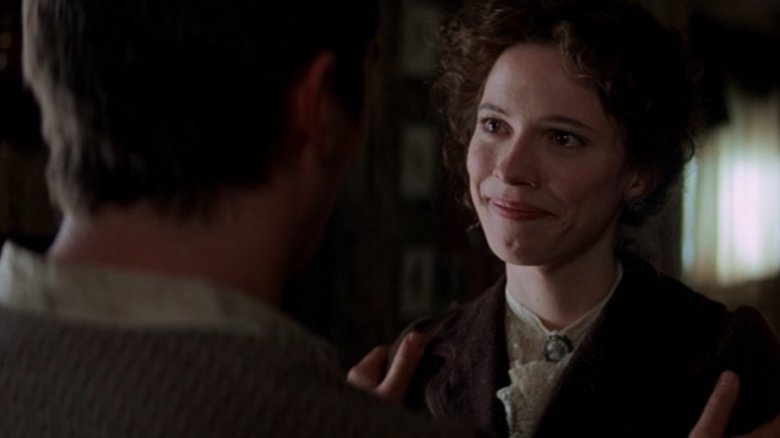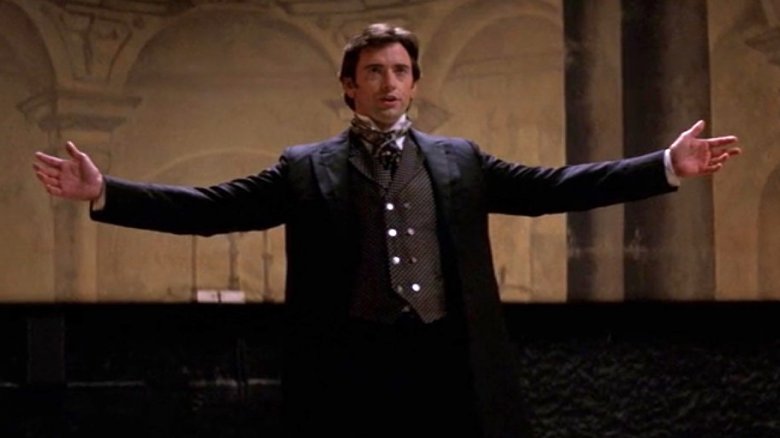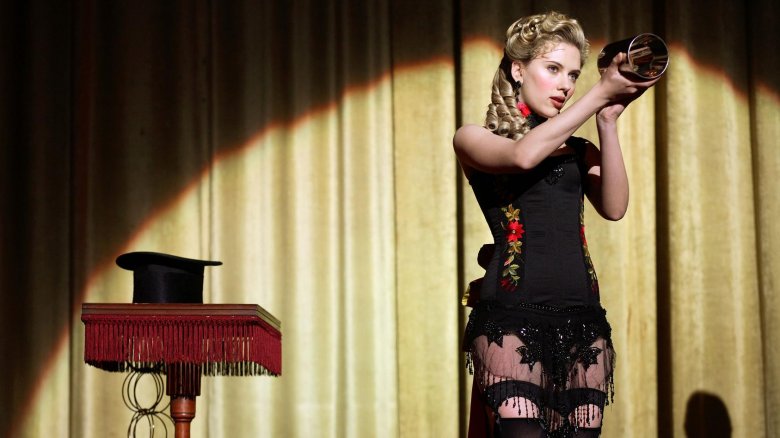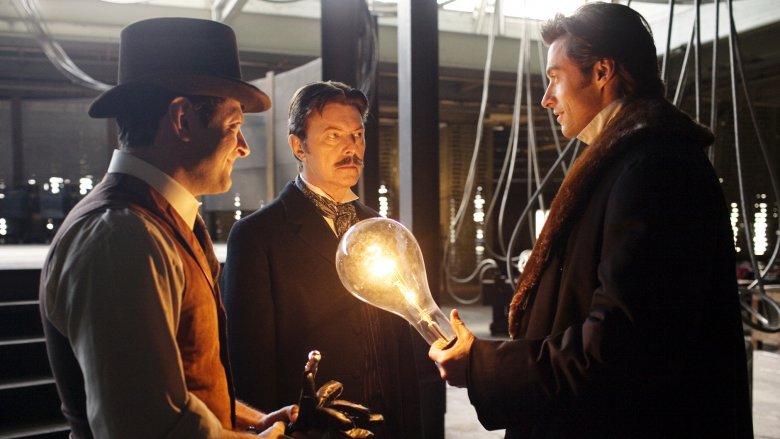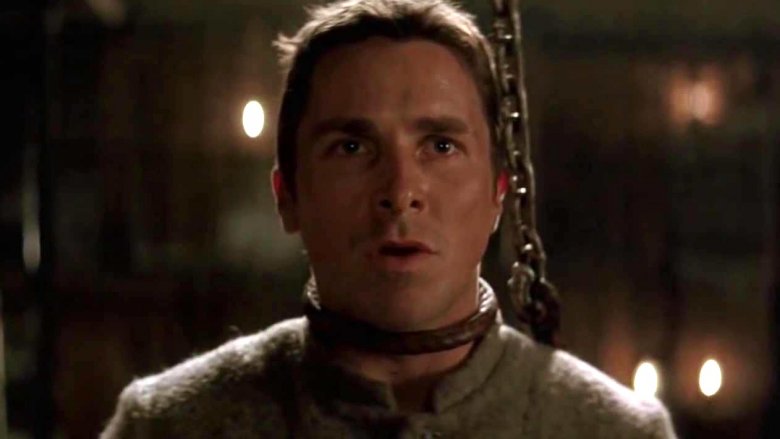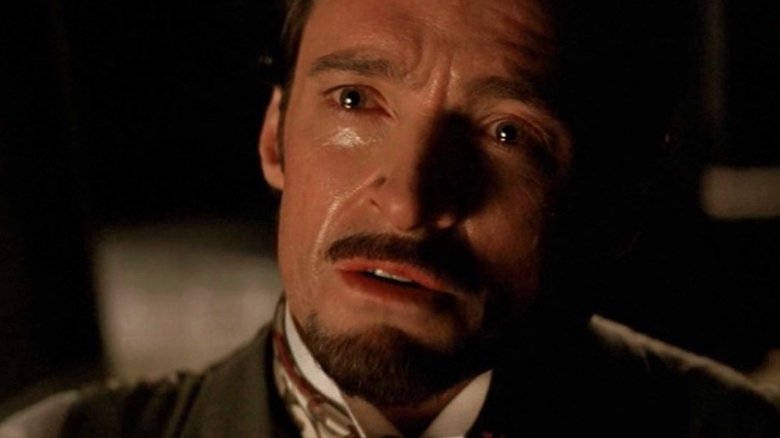The Ending Of The Prestige Explained
The story of a rapidly escalating feud between rival magicians in the 1800s, The Prestige proved Christopher Nolan wasn't a director to ignore. A twisty script, excellent editing, and stellar performances by Michael Caine, Christian Bale, and Hugh Jackman all hide the central twist of the movie in plain sight. The ending is telegraphed repeatedly, through nearly every character and every line, making it one of the most surprising, and paradoxically most foreshadowed, twists in movie history.
The "magic" of the movie's twist is that nearly every character in the movie—everyone the audience is conditioned to understand as intelligent and sober-minded—knows Borden (Christian Bale) uses a double for his trick. Cutter (Michael Caine) knows, Olivia (Scarlett Johansson) knows, Sarah (Rebecca Hall) knows. But the audience doesn't want to believe it, and neither does Robert Angier (Hugh Jackman). We're as invested as he is to discover the trick, even when every detail of the script constantly tells us the truth. We don't really want to know. We want to be fooled.
Here's the ending of The Prestige explained.
Are you watching closely?
Everything in the movie plays fairly with the audience regarding the central trick. It's all summed up in the opening narration by John Cutter: "Every great magic trick consists of three parts or acts. The first part is called 'The Pledge.' The magician shows you something ordinary: a deck of cards, a bird or a man. He shows you this object. Perhaps he asks you to inspect it to see if it is indeed real, unaltered, normal. But of course... it probably isn't. The second act is called 'The Turn.' The magician takes the ordinary something and makes it do something extraordinary. Now you're looking for the secret... but you won't find it, because of course you're not really looking. You don't really want to know. You want to be fooled. But you wouldn't clap yet. Because making something disappear isn't enough; you have to bring it back. That's why every magic trick has a third act, the hardest part, the part we call 'The Prestige.'"
As Cutter is narrating this, the camera pans over a series of identical birds, one of whom he chooses to make disappear and then reappear as the "Prestige" part of the trick. We'll see this bird trick later, when Sarah brings her nephew to a magic show, which causes him to burst into tears, asking "Where's [the bird's] brother?" It surprises Alfred Borden to hear that, not just because a child can see through the trick, but because it's his trick, the central twist of the movie. Borden is Fallon, each twins living half of a life sharing the spotlight.
Two young men at the start of our career
When the movie first flashes back to Angier reading Borden's diary for the first time, it's the audience's first glimpse of the instigating incident that starts Angier and Borden's feud. That's why Borden's narration is so easily able to trick the audience: "We were two young men at the start of a great career. Two young men devoted to an illusion. Two young men who never intended to hurt anyone."
The audience is primed to think that this narration refers to Borden and Angier, based on the premise of the movie, but that's not right. Borden and Angier never devote themselves to an illusion, Borden and Fallon do. They've devoted themselves to the illusion that there's only one Borden, and that they never intended to hurt anyone is true.
Angier's first move against Borden involves a loaded pistol, so the narrator's implication that the "two young men" who never intended harm is Borden and Angier is dismissed within the next 30 minutes of screentime. The movie wastes no time in telling you exactly what's happening, but it's so obvious you can't help but be swept along without paying attention.
Personalities and tricks
Backstage after Angier's wife escapes the water tank for the first time, Borden, Angier, and Cutter discuss their different philosophies for magic. Borden argues that "a real magician tries to invent something new, something that other magicians are gonna scratch their heads over." When Cutter asks him if he has such a trick, Borden says he does, but that "no one else can do my trick."
This scene serves a variety of purposes. Firstly, it shows how well Cutter knows the business to shoot down Borden's ideas at every turn for being reckless, but it also shows how desperate Borden is to create a trick that specifically confuses other magicians. As the two men discuss money and selling tricks, all while Bale uses a low-class London accent to show poor Borden is, Angier doesn't say much, content to just watch. Cutter and Borden are working-class people, whose jobs depend on their own success, but Angier comes from money and doesn't feel the need to engage.
Tellingly, the audience doesn't figure into their conversation; Cutter keeps mentioning money, while Borden pushes for the act of creation, performance and magic as the highest ideal, something only other magicians can understand. To confuse another practitioner is the highest praise, and Angier will spend the rest of the movie suitably scratching his head over Borden's Transported Man trick. In fact, his only contribution is to say that "any trick can be duplicated." It's no surprise he'll spend the movie's run time working on the New Transported Man.
The Water Bowl Trick
Cutter tells Angier and Borden that if they want to see what it takes to do "real magic," they need to go see Chung Ling Soo, who can make a full fish tank appear on stage.
Borden and Angier go, and afterwards, Borden tells Angier as they watch the old man dodder into a cab, "This is the trick. This is the performance. Right here. Total devotion to his art. A lot of self-sacrifice." As he's talking, the camera zooms into Borden's face to underscore the seriousness of what he's saying. We're watching a confession, Borden recognizing a fellow practitioner willing to shape his entire life around the performance of magic.
He ends the scene saying, "It's the only way to escape all this, you know?" Once again, he never mentions the audience—only the art, the sacrifice. It's empowering for him to see that his trick can work. Later, Angier will show off the trick for his wife Julia, but he does it half-mockingly, in disbelief that anyone could or would want to do that. "It's unthinkable... Borden saw it at once, but I couldn't fathom it. Living my whole life pretending to be someone else." It's a key foreshadowing of why Angier will be the only one who can't believe Borden uses a double. The self-sacrifice, the pretending... he admits right there that it's unthinkable to him.
Which knot did you tie?
When Julia drowns in the water tank, Angier screams at Borden, asking him which knot he used to tie her wrists—the one that they'd always used, or the riskier one that Borden had pushed for earlier. Borden tells him he didn't know, a line he repeats again and again throughout the movie, aggravating Angier. Even when Angier reads his diary, Borden writes that "How often I've fought with myself over that night... one half of me swearing blind that i tied a simple slip knot... the other half convinced that I tied the Langford double. I suppose I'll never know for sure."
Borden can't give Angier a simple answer about which knot he tied because the twins trade off on different days; one twin would have tied the simple knot, the other would have tied the Langford double, but Borden can't say whether he knows, whether it's the Borden who tied the knot, or the Borden who truly doesn't know which knot he tied. The illusion requires self-sacrifice.
Sometimes you're with me, sometimes you're not
Of all the characters in the movie, Sarah comes the closest to realizing Borden is two people. She tells Borden early on in the film that she can tell he doesn't always mean it when he says he loves her. She goes on to add, "Maybe today you're more in love with magic. I like being able to tell the difference, it makes the days it is true mean something."
The surviving Borden, the one who confesses to Angier the secret, is the one who loves Sarah. The other Borden is the one who falls in love with Olivia, but at this point in the film, he's not with anyone else, so Sarah guesses that he's in love with "magic" instead. This is also when Fallon enters the picture, prompting concern from Sarah that they don't have enough to pay him. Borden responds, "Don't worry about it. I'll share half my food with him." A clever reference to Fallon sharing half of everything with Borden, immediately before Sarah tells him that they're going to have a baby.
Borden responds, "Oh, we should have told Fallon! This is great. We're having a baby." The "we" in that sentence is deceptive, since it seems like he's talking about himself and Sarah, but he's really referencing Fallon/Other Borden, too. They're all having a baby together, since they shared everything, each living half a life, which includes Sarah and their daughter.
Angier's own double
When Borden begins showing his Transported Man, Angier becomes obsessed with it. He asks Cutter and Olivia both how he does it, and they both respond that it's a double. The audience should believe Cutter, since he's constantly shown to be wise and knowledgeable, and when Olivia and Borden begin their affair, she says that she finds disguise materials not used for the show, at times he couldn't possibly be watching.
We should be listening to these characters, but we're too caught up in Angier's passion. His attempt to duplicate it involves him hiring a double of his own, Gerald Root, also played by Jackman in a sly nod to Borden's true secret. Root is sleazy, an alcoholic with too much pride and not enough to live for, a disturbing mirror to the vices that Angier dabbles with throughout the film. But though Root is played by Jackman, he can't possibly live like Borden does with his trick. It rankles Angier to spend his prestige huddled underneath the stage while his double takes a bow. He's jealous of himself in a way Borden can never be, the self-sacrifice demanded of real magic is too much for him. It pushes him to send Olivia to infiltrate Borden's trust, leading to disaster for everyone.
Olivia
Until one of the Borden twins fall in love with Olivia, they're united in their desires. They achieve success, a family, and the art that they dreamed of, but once they fracture, it leads to strife. Angier kidnaps Fallon and buries him to get the cipher for a fake notebook of Borden's, thinking this will lead him to the secret behind the Transported Man. It won't, of course, but the point of the scene is that Fallon's near-death encounter leads one of the Borden twins to arrive to a dinner date with Sarah stinking drunk with Olivia along for the ride.
He tells Sarah, "I almost lost something very precious to me," implying that either he or the other Borden twin almost died, but regardless, the blatant appearance of Olivia pushes Sarah towards alcoholism—and eventually suicide when she can't stand the lies anymore. The bluntness with which Borden conducts his affair with Olivia brings to the fore all the repressed feelings Sarah was able to push down, forcing her to kill herself rather than fully betray Borden and reveal his secret.
Tesla and the clones
Of all the plot points in the movie,Tesla and his cloning machine receive the most derision. While it's true that the science-fiction addition is a surprise, it serves a few important points. First, Tesla and Edison's rivalry mirrors Angier and Borden, continuing the motif of reflections and doubles that pervades the movie. Second, it's symbolic of the corruption of Angier as a magician. He's not disappearing and bringing himself back, the way the Turn and the Prestige require. He's just copying himself over and over, killing himself in a sickening penance for the death of his wife in the same manner.
Finally, in his own way, Angier is ultimately proven right when he told Borden that "every trick can be duplicated." By cloning himself, he's able to duplicate the ultimate trick of Borden's act, the use of an identical twin. The difference between them is that he'd rather kill his twin than live his life pretending to be someone he's not.
The Turn
Angier arrives at Borden's cell to gloat and tear apart the secret to the Transported Man that he'd so obsessed over through the entire movie. Borden gives Fallon a tearful goodbye, admitting that he was right, that they should've left Angier alone, and that "We go alone now. Both of us... You go live your life in full now... You live for both of us." It's the closest the two brothers get to openly speaking to each other, with Borden apologizing for the way his affair with Olivia led to Sarah's suicide.
Borden's escorted to the hangman's noose, and asks a nearby guard, "Are you watching closely?" When asked about his final words, he responds "Abracadabra" and is dropped to his death. He disappears, but that's not magic. You can't just make something disappear. You have to bring it back.
The Prestige
Borden shoots Angier, standing alone in a hall of his drowned clones, and lays out the truth. He was Fallon, and Fallon was Borden, two men sharing one life. He reiterates that that's what magic costs, that the art requires devotion and sacrifice, a sacrifice Angier could never match. All this, he tells him, was for nothing.
Angier tells Borden that he never understood why they did this, that "the audience knows the truth. The world is simple... it's solid all the way though. But if you could fool them, even for a second, then you could make them wonder. And then you got to see something very special... the look on their faces."
It's a direct plea to the audience, straight from writers Christopher Nolan and his brother Jonathan Nolan (even more doubles), that the ability to trick the audience, to make them imagine a world like their own, but different (maybe one with cloning machines) exists right at their fingertips. Borden says earlier in the film that the secret impresses no one, but we're not so sure. Some tricks are even more impressive once you see the self-sacrifice, the total devotion to the art.
